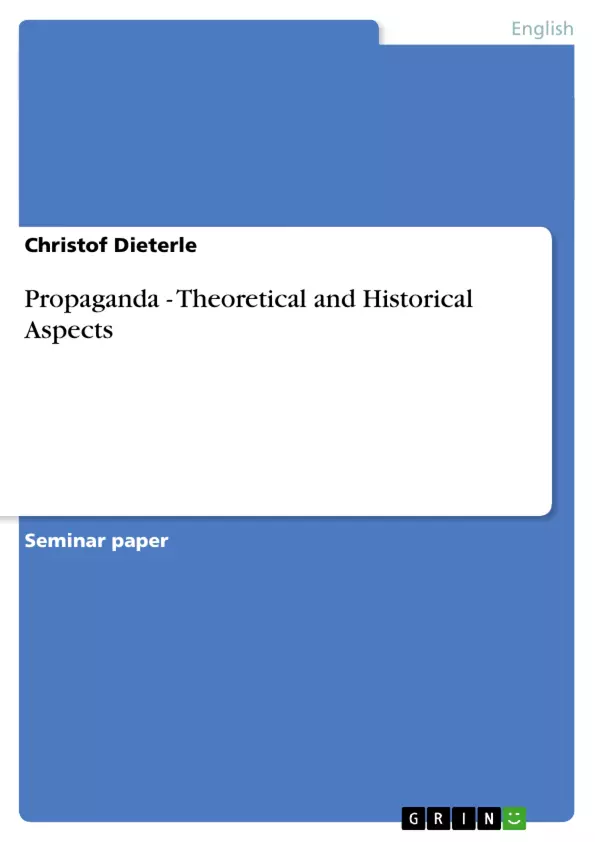Propaganda is as old as mankind. People have tried to influence others
to achieve certain goals or objectives throughout the ages. What makes
propaganda so interesting nowadays, and of special interest for my
research paper, is its combination with modern mass media. Using the
manifold possibilities offered by the various technologies it is easy to
establish a direct channel of communication to every place in the world
in not more than a second. And, if you have a channel you can convey
your ideas to others and thus gain a huge amount of influence on other
people. In times of extensive media coverage, for example of wars, I
found it a very interesting, and sometimes disturbing, task to make an
introductory analysis of the basic concepts of propaganda illustrated by
historical events.
In the first chapter of my paper I will give a rather general definition of
the term propaganda and introduce two major models of how
propaganda can be conveyed. In the last part of the first chapter I will
draw a distinguishing line between propaganda and persuasion. The
second chapter consists of a historical overview on propaganda, divided
in the periods of the Reformation, the French Revolution including
Napoleon and the Second World War with a short paragraph on Adolf
Hitler as a constructed leader figure. Analysing the ways propaganda
works is one main objective of this paper so the third chapter gives
some background on techniques of propaganda analysis followed by
the next chapter where I apply these theories to the example of the Gulf
War in 1991. The last chapter consists of a short summary and some
conclusions.
Inhaltsverzeichnis (Table of Contents)
- Introduction
- Definition of propaganda
- General definition
- Models of propaganda
- Propaganda and Persuasion
- Historical overview
- The Reformation
- The French Revolution and Napoleon
- German propaganda in the Second World War
- Analysing propaganda
- Context
- Utilizing the media
- Language
- Propaganda in action (Gulf War in 1991)
- Ideologies involved
- Context
- Media utilization techniques
- Effectiveness of propaganda
- Conclusion
Zielsetzung und Themenschwerpunkte (Objectives and Key Themes)
This paper aims to provide a comprehensive overview of propaganda, exploring its historical development and analytical framework. The paper examines how propaganda utilizes modern mass media and analyzes its effectiveness, particularly in the context of the Gulf War in 1991.
- Defining propaganda and its relationship to persuasion
- Historical development of propaganda across different periods
- Analyzing propaganda techniques and their application in specific contexts
- The role of mass media in shaping and disseminating propaganda
- The effectiveness of propaganda in influencing public opinion and behavior
Zusammenfassung der Kapitel (Chapter Summaries)
The first chapter defines propaganda, exploring its broader conceptualization and different theoretical models. The second chapter delves into the historical evolution of propaganda, examining its presence in the Reformation, the French Revolution, and the Second World War. The third chapter focuses on the analysis of propaganda, outlining key techniques and approaches to understanding its functioning. The fourth chapter applies these analytical tools to the Gulf War in 1991, examining its ideological context, media utilization, and effectiveness.
Schlüsselwörter (Keywords)
The paper focuses on key concepts such as propaganda, mass media, persuasion, ideology, historical development, propaganda analysis, context, media utilization, and effectiveness. It explores specific historical examples like the Reformation, the French Revolution, the Second World War, and the Gulf War in 1991. The paper examines how these historical events exemplify the use and impact of propaganda.
Frequently Asked Questions
How is propaganda defined in this paper?
The paper defines propaganda as a deliberate attempt to influence people's thoughts and actions to achieve specific goals, especially when combined with modern mass media.
What is the difference between propaganda and persuasion?
While both aim to influence, persuasion is generally seen as more interactive and transparent, whereas propaganda often uses manipulative techniques and one-sided communication.
Which historical periods are covered in the overview?
The historical overview includes the Reformation, the French Revolution (including Napoleon), and German propaganda during the Second World War.
How was propaganda used in the 1991 Gulf War?
The paper analyzes how mass media were utilized to shape public opinion through specific language and ideological framing during the conflict.
What are common techniques of propaganda analysis?
Analysts look at the context of the message, the medium used, the specific language or symbols employed, and the intended effect on the target audience.
Why is the role of mass media so important for propaganda today?
Modern technology allows for instantaneous global communication, making it easier than ever to disseminate ideas and exert influence on a massive scale.
- Quote paper
- Christof Dieterle (Author), 2003, Propaganda - Theoretical and Historical Aspects, Munich, GRIN Verlag, https://www.hausarbeiten.de/document/19607


